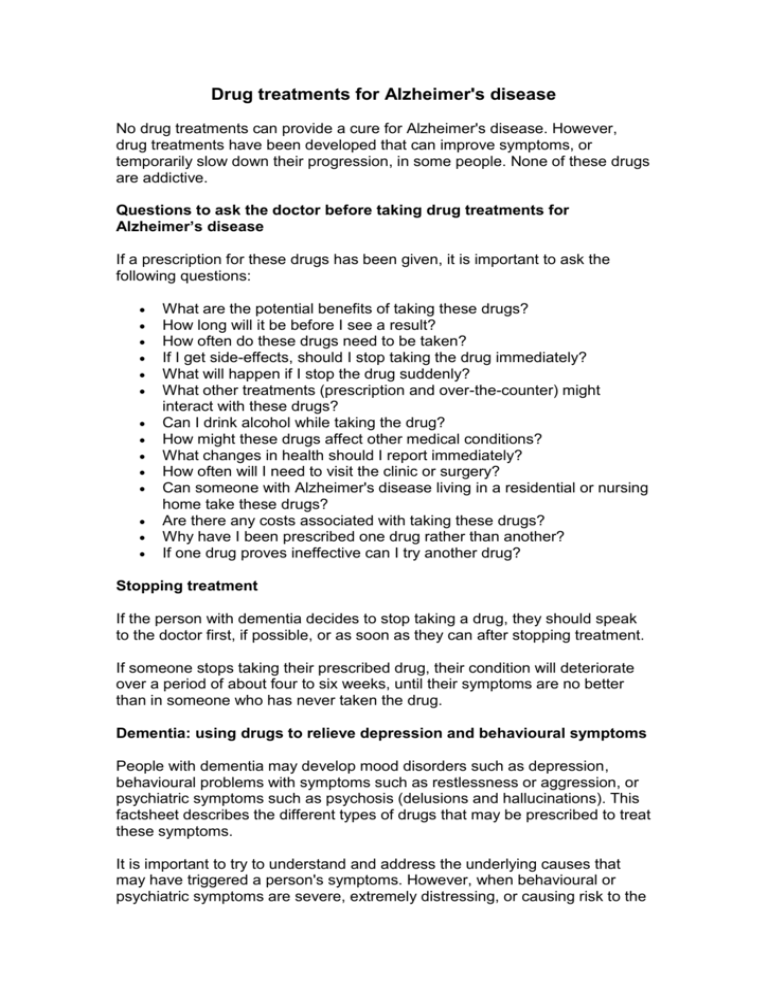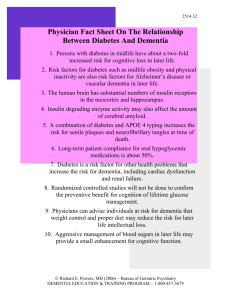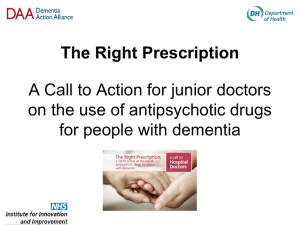Drug treatments for Alzheimer`s disease
advertisement

Drug treatments for Alzheimer's disease No drug treatments can provide a cure for Alzheimer's disease. However, drug treatments have been developed that can improve symptoms, or temporarily slow down their progression, in some people. None of these drugs are addictive. Questions to ask the doctor before taking drug treatments for Alzheimer’s disease If a prescription for these drugs has been given, it is important to ask the following questions: What are the potential benefits of taking these drugs? How long will it be before I see a result? How often do these drugs need to be taken? If I get side-effects, should I stop taking the drug immediately? What will happen if I stop the drug suddenly? What other treatments (prescription and over-the-counter) might interact with these drugs? Can I drink alcohol while taking the drug? How might these drugs affect other medical conditions? What changes in health should I report immediately? How often will I need to visit the clinic or surgery? Can someone with Alzheimer's disease living in a residential or nursing home take these drugs? Are there any costs associated with taking these drugs? Why have I been prescribed one drug rather than another? If one drug proves ineffective can I try another drug? Stopping treatment If the person with dementia decides to stop taking a drug, they should speak to the doctor first, if possible, or as soon as they can after stopping treatment. If someone stops taking their prescribed drug, their condition will deteriorate over a period of about four to six weeks, until their symptoms are no better than in someone who has never taken the drug. Dementia: using drugs to relieve depression and behavioural symptoms People with dementia may develop mood disorders such as depression, behavioural problems with symptoms such as restlessness or aggression, or psychiatric symptoms such as psychosis (delusions and hallucinations). This factsheet describes the different types of drugs that may be prescribed to treat these symptoms. It is important to try to understand and address the underlying causes that may have triggered a person's symptoms. However, when behavioural or psychiatric symptoms are severe, extremely distressing, or causing risk to the person or others, and if psychological treatments have not worked, it may be necessary to prescribe medication. The treatment of depression is slightly different, as depression has a major impact on people's functioning and quality of life. Mild depression can be treated with psychological treatments, but more severe clinically significant depression should be treated with antidepressant medication. When should drugs be used? Drugs should be avoided unless they are really necessary. Before any drugs are prescribed, it is essential to ensure that the person with dementia is physically healthy, comfortable and well cared for. Whenever possible, the person should be helped to lead an active life, with interesting and stimulating daily activities. In this way it is often possible to avoid the use of sedative drugs altogether. Some symptoms should always be treated, including: pain, and any underlying medical conditions (such as infections), as these can often cause or worsen behavioural symptoms problems with eyesight or related medical problems, such as cataracts, as these can significantly contribute to the development of visual hallucinations and can increase their vulnerability hearing difficulty, as if left untreated this can make a person more confused. Possible effects Drugs will be more effective if they are taken exactly as prescribed by the doctor, in the correct dose, and are monitored regularly for side-effects. If symptoms are difficult to control, the GP may refer to a specialist for further advice. Do not expect immediate results. Benefits may take several weeks to appear, particularly with antidepressants and antipsychotics. Some drugs, such as antidepressants and antipsychotics, need to be taken regularly to have an effect. These drugs are not helpful when given on an as-needed basis. This should only be done after discussion with the doctor. All drugs have side-effects that may worsen symptoms. Side-effects may occur early or late in the course of treatment, so it is important to ask the doctor what to expect. Side-effects are usually related to the dose. The doctor will usually 'start low and go slow', gradually increasing the dose until the desired effects are achieved. Bear in mind that certain combinations of drugs may counteract each other. Remind your doctor if other medications are being taken. All medications should be taken to clinic and hospital appointments. Don't assume that a drug that has proved to be useful at one time will continue to be effective. Dementia is a degenerative condition, so the chemistry and structure of the brain will change during the course of the illness. Once treatment has been established, it is important that it is reviewed regularly. In most circumstances, drugs for behavioural problems should not be prescribed for more than three months without a trial of stopping the treatment. Remember that many of the drugs taken to treat mood symptoms, behavioural problems and psychiatric symptoms can be dangerous if accidentally taken in large quantities, so make sure medicines are kept safe and secure. Treating restlessness, aggression and psychotic symptoms All good practice guidelines state clearly that non-pharmacological treatments should be tried before drugs for the treatment of aggression and restlessness, unless there is severe and persistent risk of harm to the person with dementia or others. Simple psychological interventions can be very beneficial, and can frequently prevent the need for drugs. These include: social interaction psychological therapies based on a detailed analysis of the problem other psychological approaches such as reminiscence therapy. Antipsychotics Antipsychotics (also known as neuroleptics or major tranquillisers) are drugs that were originally developed and are effective for the treatment of people with schizophrenia. They are the most commonly used drug treatments for the treatment of restlessness, aggression and psychiatric symptoms in people with dementia. Combining the results of clinical trials suggests that this type of drug can reduce aggression and, to a lesser extent, psychotic symptoms over a period of three months. However, there is no evidence that these drugs improve restlessness or other non-aggressive behavioural symptoms. Longer-term clinical trials show that the benefits are very limited over longer periods. These drugs can be safely stopped after three months, with no worsening of behavioural symptoms in most people. There is no evidence of any beneficial effects of antipsychotic drugs in people with dementia with Lewy bodies, and there are currently no clinical trials looking at these drugs in people with vascular dementia. Side-effects and points to remember: Side-effects can include excessive sedation, dizziness, unsteadiness, and symptoms that resemble those of Parkinson's disease (shakiness, slowness and stiffness of the limbs), chest infections, ankle swelling and falls. More recently, there have been increasing concerns about the risk of serious side-effects such as stroke and premature death, leading to warnings from the regulatory authorities about the safety of these treatments for people with dementia. The risk of these serious side-effects is quite low over short periods of treatment (up to three months), but becomes much higher over longer treatment periods. Antipsychotics may be particularly dangerous for people with dementia with Lewy bodies, possibly causing sudden death. If a person with dementia with Lewy bodies must be prescribed an antipsychotic drug, this should be done with the utmost care, under constant supervision, and they should be reviewed regularly by the GP or consultant. Whichever drug is used, treatment with antipsychotics should be regularly reviewed and the dose reduced or the drug withdrawn if sideeffects become unacceptable. Excessive sedation with antipsychotics may reduce symptoms such as restlessness and aggression at the expense of the person's mobility and coherence. Evidence is also beginning to accumulate to suggest that antipsychotics may accelerate the rate of decline in people with dementia, so there are particular concerns about the long-term use of these drugs. Side-effects and the risk of premature death are even greater if antipsychotics are combined with other sedative drugs. Combinations of different sedative drugs are strongly discouraged in people with dementia. Anticonvulsant and antidepressant drugs Anticonvulsant drugs and antidepressants are also sometimes used to reduce aggression and agitation. There is some evidence from several small clinical trials that these drugs can help these symptoms, but more evidence is needed, and the safety of these treatments used in this way for people with dementia has not been established in large or longer-term studies. These drugs should not usually be combined with each other or with antipsychotics. Treating depression Symptoms of depression are common in dementia. In the early stages they may be a reaction to the person's awareness of their diagnosis. Depression may also be the result of reduced chemical transmitter function in the brain. Simple non-drug interventions, such as an activity or exercise programme or other types of psychological treatment can be very helpful − especially for mild depression. Antidepressants may be helpful not only in improving persistently low mood but also in controlling the irritability and rapid mood swings that often occur in dementia and following a stroke. Once started, the doctor will usually recommend prescribing antidepressant drugs for a period of at least six months. In order for them to be effective, it is important that they are taken regularly without missing any doses. Improvement in mood typically takes two-to-three weeks or more to occur. Side-effects may appear within a few days of starting treatment. Treating anxiety Anxiety states, accompanied by panic attacks and fearfulness, may lead to demands for constant company. There is no research evidence about the treatment of anxiety in people with dementia, so recommendations made here are based on clinical experience. Mild symptoms are usually helped by reassurance, adjustments to the environment or an improved structure to everyday life. For more persistent mild anxiety, psychological treatments can be helpful. More severe and persistent anxiety is often related to underlying depression, and will probably improve with antidepressant treatments. Treating sleep disturbance Sleep disturbance − in particular, persistent wakefulness and night-time restlessness − can be distressing for the person with dementia and difficult for the people around them. Many of the drugs commonly prescribed for people with dementia can cause excessive sedation during the day, leading to an inability to sleep at night. Increased stimulation during the day and avoiding caffeinated drinks late at night will reduce sleep problems. Aromatherapy with lavender can also help. It is important to have realistic expectations about what duration of sleep should be expected. Older people rarely sleep for more than five-to-six hours at night, and in people with dementia this will often be spread out over a full 24 hours. In care homes and nursing homes, the person's care plan must meet these 24-hour needs. In most circumstances, this should be achieved without the need for medication. When people are at home, pressure upon carers, or risks related to people getting up at night, can sometimes necessitate the use of medication − although there is no research evidence assessing the value of this approach. Hypnotics are generally more helpful in getting people off to sleep at bedtime than they are at keeping people asleep throughout the whole of the night. They are usually taken 30 minutes to one hour before going to bed. Side-effects If excessive sedation is given at bedtime, the person may be unable to wake to go to the toilet and incontinence may occur − sometimes for the first time. If the person does wake up during the night despite sedation, increased confusion and unsteadiness may occur. Hypnotics are often best used intermittently, rather than regularly, when the carer and person with dementia feel that a good night's sleep is necessary for either or both of them. The use of such drugs should be regularly reviewed by the doctor.









